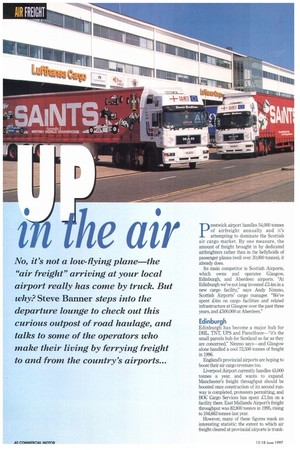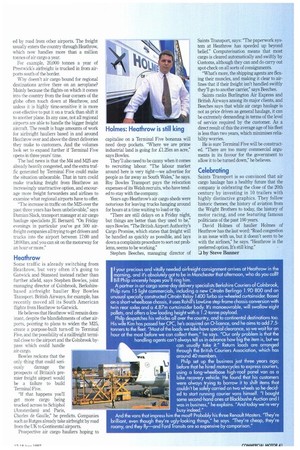he air
Page 52

Page 53

If you've noticed an error in this article please click here to report it so we can fix it.
No, it's not a low-flying plane—the "air freight" arriving at your local airport really has come by truck. But why? Steve Banner steps into the departure lounge to check out this curious outpost of road haulage, and talks to some of the operators who make their living by ferrying freight to and from the country's airports... prestwick airport handles 54,000 tonnes of airfreight annually and it's attempting to dominate the Scottish air cargo market. By one measure, the amount of freight brought in by dedicated airfreighters rather than in the bellyholds of passenger planes (well over 30,000 tonnes), it already does.
Its main competitor is Scottish Airports, which owns and operates Glasgow, Edinburgh, and Aberdeen airports. At Edinburgh we've not long invested £3.4m in a new cargo facility," says Andy Nimmo, Scottish Airports' cargo manager. "We've spent ,E4m on cargo facilities and related infrastructure at Glasgow over the past three years, and £500,000 at Aberdeen."
Edinburgh
Edinburgh has become a major hub for DHL, TNT, UPS and Parcelforce—"it's the small parcels hub for Scotland so far as they are concerned," Nimmo says—and Glasgow alone handled a cool 72,500 tonnes of freight in 19%.
England's provincial airports are hoping to boost their air cargo revenues too.
Liverpool Airport currently handles 45,000 tonnes a year, and wants to expand. Manchester's freight throughput should be boosted once construction of its second runway is completed, protesters permitting, and BOC Cargo Services has spent £1.5m on a facility there. East Midlands Airport's freight throughput was 82,800 tonnes in 1995, rising to 104.663 tonnes last year.
However, many of these figures mask an interesting statistic: the extent to which air freight cleared at provincial airports is trunk ed by road from other airports. The freight usually enters the country through Heathrow, which now handles more than a million tonnes of air cargo a year.
For example, 20,000 tonnes a year of Prestwick's airfreight is trucked in from airports south of the border.
Why doesn't air cargo bound for regional destinations arrive there on an aeroplane? Mainly because the flights on which it comes into the country from the four corners of the globe often touch down at Heathrow, and unless it is highly time-sensitive it is more cost-effective to put it on a truck than shift it to another plane. In any case, not all regional airports are able to handle the bigger freight aircraft. The result is huge amounts of work for airfreight hauliers based in and around Heathrow over and above the direct deliveries they make to customers. And the volumes look set to expand further if Terminal Five opens in three years' time.
The bad news is that the M4 and Iv125 are already heavily congested, and the extra traffic generated by Terminal Five could make the situation unbearable. That in turn could make trucking freight from Heathrow an increasingly unattractive option, and encourage more freight forwarders and airlines to examine what regional airports have to offer.
"The increase in traffic on the M25 over the past three years has been unbelievable," says Damian Slack, transport manager at air cargo haulage specialists JE Bernard. "On Friday evenings in particular you've got 500 airfreight companies all trying to get drivers and trucks into the airport between 17:00 and 18:00hrs, and you can sit on the motorway for an hour or more."
Heathrow
Some traffic is already switching from Heathrow, but very often it's going to Gatwick and Stansted instead rather than further afield, says Stephen Bowles, joint managing director of Colnbrook, Berkshirebased airfreight haulier Roy Bowles Transport. British Airways, for example, has recently moved all its South American flights from Heathrow to Gatwick.
He believes that Heathrow will remain dominant, despite the blandishments of other airports, pointing to plans to widen the M25, create a purpose-built turn-off to Terminal Five, and the possibility of a railfreight terminal close to the airport and the Colnbrook bypass which could handle air cargo.
Bowles reckons that the only thing that could seriously damage the prospects of Britain's premier freight airport would be a failure to build Terminal Five.
"If that happens you'll get more cargo being trucked across to Schiphol (Amsterdam) and Paris, Charles de Gaulle," he predicts. Companies such as Rutges already take airfreight by road from the UK to Continental airports.
Prospective air cargo hauliers hoping to capitalise on a Terminal Five bonanza will need deep pockets. "Where we are prime industrial land is going for £1.25m an acre," says Bowles.
They'll also need to be canny when it comes to recruiting labour. "The labour market around here is very tight—we advertise for people as far away as South Wales," he says. Roy Bowles Transport pays the relocation expenses of its Welsh recruits, who have tended to stay with the company.
Years ago Heathrow's air cargo sheds were notorious for leaving trucks hanging around for hours at a time waiting to load or tip.
"There are still delays on a Friday night, but things are better than they used to he," says Bowles. "The British Airport Authority's Cargo Promise, which states that freight will be handled as quickly as possible, and lays down a complaints procedure to sort out problems, seems to be working."
Stephen Beeches, managing director of Saints Transport, says: "The paperwork system at Heathrow has speeded up beyond belief." Computerisation means that most cargo is cleared automatically and swiftly by Customs, although they can and do carry out spot-check on all sorts of consignments.
"What's more, the shipping agents are flexing their muscles, and making it clear to airlines that if their freight isn't handled swiftly they'll go to another carrier," says Beeches.
Saints ranks Burlington Air Express and British Airways among its major clients, and Beeches says that while air cargo haulage is not as price driven as general haulage, it can be extremely demanding in terms of the level of service required by the customer. As a direct result of this the average age of his fleet is less than two years, which minimises reliability worries.
He is sure Terminal Five will be constructed "There are too many commercial arguments in its favour for the government to allow it to be turned down," he believes.
Celebrating
Saints Transport is so convinced that air cargo haulage has a healthy future that the company is celebrating the close of the 20th century by investing in 10 trailers with highly distinctive graphics. They follow historic themes; the history of aviation from the Wright Brothers to today, the history of motor racing, and one featuring famous politicians of the past 100 years.
David Holmes of haulier Holmes of Heathrow has the last word: "Road congestion is an issue with us, but it doesn't seem to be with the airlines," he says. "Heathrow is the preferred option. It's still king."
:I by Steve Banner
























































































































